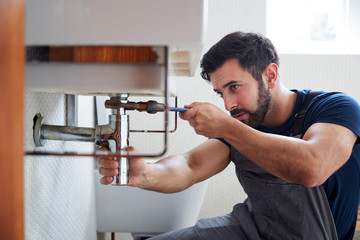A plumbing system is crucial for every house and business. It provides safe and clean drinking water and proper waste management. It also ensures that the environment remains cleaner and odor-free.
Backflow testing is a vital part of any plumbing system. It prevents diseases such as typhoid and dysentery from spreading through the community. Contact Plumbing Express, Inc. for professional help.
The plumbing system is essential for delivering freshwater in buildings and removing wastewater and sewage. Its components include pipes, fixtures, and valves. The pipes are made from different materials, such as copper, iron, and plastic. Pipes can be either straight or curved, and they are joined together with fittings. There are several types of fittings, including elbows, tees, and unions. These fittings connect the pipes to each other and to fixtures, such as faucets and showers. They also control the flow of water and prevent leaks.
There are two main parts of a plumbing system: the water supply line and the drain-waste-ventilation (DWV) line. The water supply line brings freshwater into the home and connects to each fixture, including toilets, sinks, and appliances. The water is then pumped under pressure through distribution pipes to each fixture. The water then flows through the appliance or fixture and out into the waste pipes, where it is removed from the house.
Drainage plumbing systems remove wastewater from the building and transport it to the sewer system or septic tank. This includes waste from baths, showers, washing machines, and kitchen sinks. It also includes sanitary sewer systems and stormwater drains. Drainage plumbing systems must be properly vented to avoid a vacuum and ensure proper drainage.
A plumbing system can be complex, but it is necessary for a safe and healthy environment. A faulty plumbing system can lead to many problems, including flooding, mold growth, and health hazards. It is important to understand how a plumbing system works and how it can be maintained.
Plumbing is a vital part of every home and building, and it requires regular maintenance to keep it working properly. A professional plumber can help with any issues you may have with your plumbing system. They can also advise you on how to save money by reducing your water usage.
While plumbing and piping share some similarities, they have distinct functions and require different state and federal regulations. Plumbing is used to convey fluids through a building, while process piping carries chemicals, gasses, and other fluids during the manufacturing process.
It is a profession that requires specialized training.
Plumbers have a wide variety of duties, from fixing leaking faucets to installing whole house water filtration systems. They must be able to work well under pressure and solve problems quickly. In addition, they must be able to read blueprints and understand basic codes and regulations. Those who want to become plumbers must undergo a rigorous apprenticeship program and pass a certification exam. The requirements vary by state, but may include completing a certain number of hours of classroom instruction or earning a degree from a trade school or community college.
The profession of plumbing is regulated by local and federal authorities. Many states require plumbers to be licensed. This includes passing a background check and a drug test, as well as undergoing education and training. The Occupational Safety and Health Administration (OSHA) also regulates the plumbing industry.
In addition to being a highly skilled and versatile profession, plumbing is also relatively safe. Plumbers can expect to encounter occasional workplace hazards, but these are usually minor and can be avoided with proper training and preparation. For example, it is important to wear safety equipment, such as face masks and goggles, when working with chemicals or other hazardous materials. In addition, plumbers should be aware of the potential risks associated with working on old or damaged building infrastructures or in high-density living areas.
Depending on the type of plumbing project, plumbers can specialize in residential, commercial, or industrial work. Each of these types of projects has its own unique challenges and requires specialized knowledge. For instance, commercial plumbing involves complex pipe installations and repairs in buildings and large housing complexes. It can also involve sewage and waste management systems.
Plumbers must be able to work with a variety of tools and equipment, including hand-held devices and power tools. They also must have access to the right materials, which can be expensive. In addition, they must be able read and interpret blueprints. Some plumbers also choose to pursue certification in gas plumbing, which involves repairing and maintaining gas pipes and appliances. Those who pursue this specialised field should note that additional qualifications are required to work with LPG.
It is a job that pays well.
Plumbing is a very rewarding career for those who like hands-on work and problem-solving. It also provides a great way to make a good living, especially if you work for a union. Many plumbers also have the option of gaining additional certifications to increase their earning potential. They can also make more money by bringing in clients through referrals. These extras can help them pay for things like child care and mortgage payments.
Another benefit of a plumbing job is the variety of tasks. You can work on a variety of projects, from fixing a dripping faucet to installing new systems in homes and buildings. The work is constantly changing and challenging, so it’s a great choice for people who need a change of scenery or a challenge.
Plumbing jobs are in high demand, so you can find a lot of employment opportunities. You can also find a lot of benefits, including health insurance and retirement options. Many plumbers also choose to become part of a labor union, which can provide even more benefits.
Plumbers can make a good living, and their salary depends on the area where they live. They can earn up to $60,000 a year, which is more than the average college grad. In addition, many plumbers can get a promotion within their company, which means higher salaries and more opportunities to advance.
Those who have a passion for the environment can enjoy this profession because it contributes to preserving water and waste management. In addition, it can save lives by reducing the risk of water-borne diseases. It’s important to remember that a successful plumbing business depends on the work ethic of its employees. This is why it’s essential to offer practical benefits for your employees. This will help them feel comfortable in their work environment and avoid stress that can impact their mental health.
Providing your plumbers with health and dental coverage is an excellent way to keep them happy and healthy on the job. This will also protect them from high medical bills, especially if they are injured at work. It’s also a great way to retain your best employees, which can be a difficult task in this industry.
It is a career that requires a college degree.
A career in plumbing requires a lot of specialized knowledge and skills. It also requires a certain amount of training, which can be achieved through either college coursework or an apprenticeship program. In the case of an apprenticeship, the student will receive on-the-job training under a master plumber, and will also be required to attend classes at a vocational school. This type of training will provide students with a strong foundation in the basics of plumbing, as well as more advanced topics such as water piping methods and design, sewer systems, and plumbing fixtures.
There are many ways to become a plumber, including earning a high school diploma or GED certificate. Once a person has earned this, they can then begin to pursue their plumbing certification or degree at an online vocational school. These schools are a great way for people to gain the skills and experience needed to become a licensed plumber. They can also give the students a piece of paper that will help them prove their qualifications to potential employers.
Once a person has completed their plumbing certification or degree, they can begin looking for a job. They can find a job with a general contractor or with a residential service company. This is a great way to get started in the field, and will allow the plumber to work on a variety of different projects. Then, they can start to focus on what they really like to do.
Once a plumber has established themselves in the industry, they can start to specialize in their work. They can choose to work on new construction projects, repair and replace existing pipes, or even install a water treatment system for a city. They can even choose to do plumbing engineering, which allows them to design a new pipeline or system of pipes for a project. As long as there is a need for plumbing services, there will always be a need for plumbers. There are many different jobs available for plumbers, from entry-level positions to management and supervisory roles. It is important to have a good education and training to ensure that you can succeed in this lucrative career.
